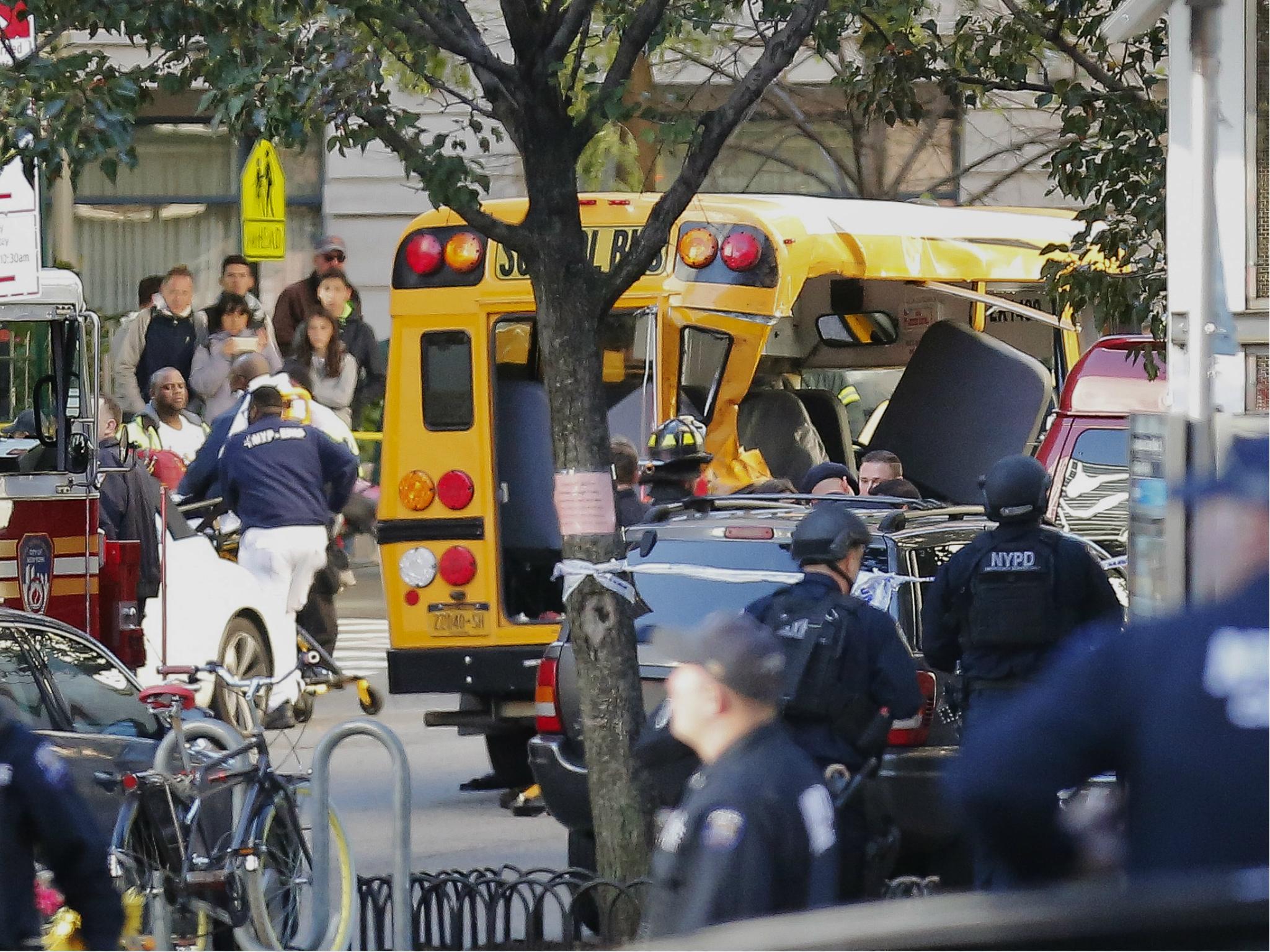What we know about the Uzbek Isis suspect in New York and why he might have done it
The President is reluctant to concede that the travel ban is not the silver bullet he made it out to be. Such restrictions are futile in the face of a dynamic, transnational ideology

The attack in New York on Tuesday afternoon, in which eight people were killed and at least a dozen others injured, is a timely reminder that despite the battlefield victories in Mosul, Raqqa and elsewhere, the threat of Islamist-inspired terrorism remains.
The 29-year-old suspect reportedly drove his rented vehicle 14 blocks before crashing into a school bus before emerging with two replica firearms. The suspected attacker, identified as Sayfullo Habibullaevic, an Uzbek national who legally moved to the US in 2010, was taken to hospital after being shot and wounded by police officers and is expected to survive.
While there has been no immediate claim of responsibility, authorities investigating the attack have said that a note written in a foreign language pledging allegiance to Isis was discovered in the vehicle. As expected in such cases, there has also been celebratory activity on jihadi communications platforms, with supporters and sympathisers praising the attack.
The description of Sayfullo Habibullaevic being a lone wolf attacker is premature and potentially misleading. While the individual may have acted alone, experience from previous investigations into similar attacks suggests the likelihood that a broader, loose network could be involved.
The act is often conducted by a single attacker, but often other individuals, whether through physical or digital interactions, provide an environment for the extremist ideas to flourish and such actions encouraged.
While it is not known whether Habibullaevic had links to any known jihadi groups, he comes from a country that is no stranger to jihadi activity. The Islamic Movement of Uzbekistan (IMU), established in 1991, has sought to overthrow the Uzbek government and replace it with an Islamic government to rule by a strict interpretation of Sharia law.
However, government crackdowns saw the group disperse and broaden its area of operations, particularly in neighbouring Afghanistan and Tajikistan, where the group had been active in forming alliances with other jihadi groups such as al-Qaeda and the Taliban. The IMU was designated a terrorist organisation by the United Nations in 2001.

Months after the declaration of Isis’ so-called caliphate in Syria and Iraq, militants belonging to the IMU were among the first to pledge allegiance to the group, with an online statement issued by a senior leader of the group praising Isis for its disregard for international borders, hoping that the group would one day seize control of Palestine and the Islamic holy cities of Mecca and Medina.
Isis has been cognisant of its large audiences in Russia and Central Asia, with propaganda material, including Rumiyah magazine, circulated in the Russian language. While not on the same scale as attacks in Western Europe, there have been several small-scale attacks in Russia and the Former Soviet Republics claimed by Isis.
Figures from the United Nations Development Programme (UNDP) show that around 500 foreign fighters from Uzbekistan have travelled to join Isis, while a report published in October 2017 by the Soufan Group suggests a higher estimate, with around 1,500 Uzbek nationals believed to have travelled to join Isis in Iraq and Syria.
The same report also determined that the proportion of regional foreign fighters from Former Soviet Republics was more than any other region, with over 8,000 invidious believed to have travelled to join the so-called caliphate, more than the number of foreign fighters from the Middle East (7,054) and Western Europe (5,718).
Given that Uzbekistan doesn’t feature on President Trump’s list of banned countries, judging from his response, stating that we must not allow Isis to return or enter the US after defeating them in the Middle East, the President is reluctant to concede that the travel ban is not the silver bullet he made it out to be. Such restrictions are futile in the face of a dynamic, transnational ideology.
The reality is that what connects Isis in Syria and Iraq to the insurgency in the Philippines, Nigeria, Afghanistan, and Egypt, and to the attacks we have witnessed in London, Manchester, Paris, Nice, Berlin, and Barcelona is not necessarily a tangible operational link, but rather a worldview, a set of ideas.
If only an operational link existed. We could end this in a matter of months, if not weeks. Unfortunately, the battle against the ideology connecting them all will be a generational struggle.
An ideology that cherry picks and manipulates Islamic scripture, seeks to divide the world between “believers” and “non-believers”, driven by a desire to implement by force a narrow articulation of Islam, alien to the majority of the world’s Muslims, and to eliminate any element of integration and coexistence between Muslims and non-Muslims.
Defeating Isis militarily is an important step in the fight against terrorism, but there is a bigger battle taking place, where men, women, and children, from all ethnicities and backgrounds, are being attracted to the closed-minded worldview of Islamist extremism.
Overcoming this threat needs more than physical security measures. Bullets and bombs cannot defeat an idea; travel bans cannot contain a borderless ideology. An open-minded approach that deals with the symptomatic violence and the underlying ideas must be the way forward.
Mubaraz Ahmed is an Analyst at the Tony Blair Institute for Global Change
Join our commenting forum
Join thought-provoking conversations, follow other Independent readers and see their replies
Comments
Bookmark popover
Removed from bookmarks